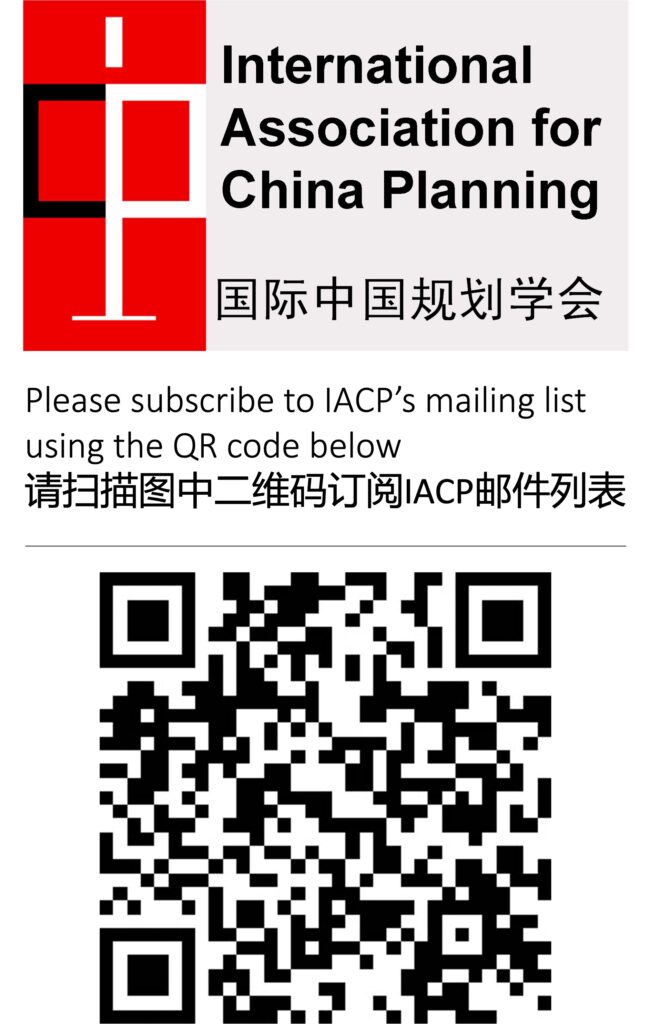Qing  Shen (沈青) is a Professor and former Chair of the Department of Urban Design and Planning at the University of Washington. From 2004 to 2005, he and Dr. Yan Zhang (章岩) led the effort to form the International Association for China Planning (IACP). He was also instrumental to the early development of IACP, serving as its Vice Chair from 2005 to 2007, and Chair from 2007 to 2009. As the Chair of IACP, he worked with Professor Richard LeGates and other BOD members to successfully obtain the 503(c) non-profit organization status for the association. He worked with Professor Jiangang Xu (徐建刚), who was the Chair of the Department of Urban Planning and Design at Nanjing University, to start the tradition of hosting the annual IACP conference at a university in China. In addition, he led the effort to establish the Karen R. Polenske Award, and is still co-chairing the Karen R. Polenske Scholarship Fund with Ms. Meizhi Yan (颜湄之).
Shen (沈青) is a Professor and former Chair of the Department of Urban Design and Planning at the University of Washington. From 2004 to 2005, he and Dr. Yan Zhang (章岩) led the effort to form the International Association for China Planning (IACP). He was also instrumental to the early development of IACP, serving as its Vice Chair from 2005 to 2007, and Chair from 2007 to 2009. As the Chair of IACP, he worked with Professor Richard LeGates and other BOD members to successfully obtain the 503(c) non-profit organization status for the association. He worked with Professor Jiangang Xu (徐建刚), who was the Chair of the Department of Urban Planning and Design at Nanjing University, to start the tradition of hosting the annual IACP conference at a university in China. In addition, he led the effort to establish the Karen R. Polenske Award, and is still co-chairing the Karen R. Polenske Scholarship Fund with Ms. Meizhi Yan (颜湄之).
Professor Shen graduated from Zhejiang University in 1982 with a BS in Architecture, He obtained an MA in Urban Planning at the University of British Columbia in Canada in 1986. He continued his graduate studies at the University of California, Berkeley, where he earned a PhD in City and Regional Planning in 1993. In the same year, he was appointed as an Assistant Professor of Urban Studies and Planning at MIT, and thus became the first person from the post-Cultural Revolution China to hold a tenure-track urban planning faculty position in North America. In 2000, he was recruited by the University of Maryland as a tenured associate professor. He was promoted to full professor in 2006 and he served as the Associate Dean for Academic Affairs of the University of Maryland’s School of Architecture, Planning, and Preservation from 2007 to 2009. He joined the University of Washington in 2009 as Professor and Chair of the Department of Urban Design and Planning.
His main areas of research and teaching are urban economics and transportation planning. Of the many journal articles that he has authored or co-authored, four have won best paper awards from, respectively, URISA, AAG, WSTLUR, and ACSP. It is worth particular mentioning that in the late 1990s he developed a set of accessibility measures which has become a widely applied analytical tool in urban planning and related disciplines, and that his application of these measures to urban labor market research has fundamentally changed the once prevailing simplistic view of central city as a geographically disadvantaged residential location for low-skilled people seeking employment. He and his students have also conducted innovative research to examine the effects of new information and communications technologies on people’s travel behavior, as well as the effects of built environments on travel-related energy consumption. As a reflection of his significant research impact, in 2000 he became the first Chinese appointed to the editorial board of the Journal of the American Planning Association, and in 2006 he was the first Chinese appointed to the editorial board of the Journal of Planning Education and Research. Currently, he and his graduate students are conducting research in a range of topic areas related to urban transportation planning and policy, including TOD for sustainable urban development, the built environment as a determinant of bicycle route choice and safety, and the implications of new technologies for future urban transportation.
For the last ten years, he has engaged in collaborative research with colleagues in China. As a visiting professor at Tongji University, he currently works with Professor Haixiao Pan (潘海啸) to explore paths to multi-modal green transportation in Chinese mega cities. In 2014, he was appointed as the adjunct Overseas Dean (海外院长) of the School of Architecture and Design at Southwest Jiaotong University, where he has since been playing a major role in facilitating international collaborations on research and education.

 Scan the QR code below to connect with IACP official WeChat account.
Scan the QR code below to connect with IACP official WeChat account.
